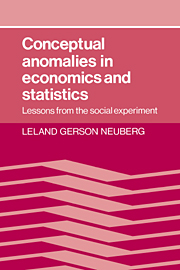Summary
The idea of a controlled social experiment
The historical origin of the income maintenance experiments
Beginning in the early 1960s, the work of quantitative social scientists and applied statisticians began to play an increasing role in social policy deliberations in the United States. But their experience with the Coleman Report, which appeared in mid-1966, made many leading policy-oriented statisticians and social scientists doubt the value of large-scale observational studies (such as Coleman's) as aids in formulating social policy. Some began to argue for the statistician's classical Fisher-type controlled experiment as the needed precursor to public policy formulation.
Meanwhile, rebellions in the inner cities replaced the civil rights movement of the early 1960s. In an economic expansion driven by the Vietnam War, these rebellions triggered one traditional response of the state: an expansion of the welfare system and a stepping-up of the “War on Poverty.” But political liberals in the antipoverty programs and welfare rights groups began to argue for even more: a guaranteed income program to replace the demeaning welfare system. Economists of many political persuasions were amenable, for different reasons, to one form of guaranteed income: a negative income tax (NIT). But political conservatives in Congress balked, claiming that such a program would lead the poor to stop working.
In late 1966, Heather Ross, an M.I.T. economics doctoral candidate, working for a Washington antipoverty agency, made a proposal that eventually broke the political deadlock (Ross 1966).
- Type
- Chapter
- Information
- Conceptual Anomalies in Economics and StatisticsLessons from the Social Experiment, pp. 1 - 12Publisher: Cambridge University PressPrint publication year: 1989



